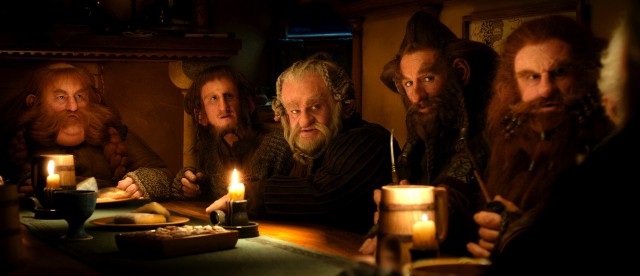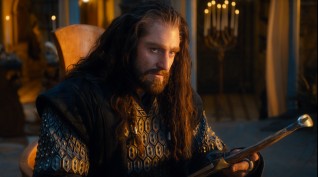The Hobbit: An Unexpected Journey Movie Review
 |
The Hobbit: An Unexpected Journey
Theatrical Release: December 14, 2012 / Running Time: 170 Minutes / Rating: PG-13 Director: Peter Jackson / Writers: J.R.R. Tolkien (novel); Fran Walsh, Philippa Boyens, Peter Jackson, Guillermo del Toro (screenplay) Cast: Ian McKellen (Gandalf), Martin Freeman (Bilbo Baggins), Richard Armitage (Thorin), Ken Scott (Balin), Graham McTavish (Dwalin), William Kircher (Bifur, Tom Troll), James Nesbitt (Bofur), Stephen Hunter (Bombur), Dean O'Gorman (Fili), Aidan Turner (Kili), John Callen (Oin), Peter Hambleton (Gloin, William Troll), Jed Brophy (Nori), Mark Hadlow (Dori, Bert Troll), Adam Brown (Oli), Ian Holm (Old Bilbo Baggins), Elijah Wood (Frodo Baggins), Hugo Weaving (Elrond), Cate Blanchett (Galadriel), Christopher Lee (Saruman), Andy Serkis (Gollum), Sylvester McCoy (Radagast), Barry Humphries (Great Goblin), Jeffrey Thomas (Thror), Michael Mizrahi (Thrain), Lee Pace (Thranduil), Manu Bennett (Azog), Conan Stevens (Bolg), John Rawls (Yazneg), Stephen Ure (Fimbul, Grinnah), Timothy Bartlett (Master Worrywort), Bret McKenzie (Lindir), Kiran Shah (Goblin Scribe), Benedict Cumberlatch (Necromancer), Glenn Boswell (Dwarf Miner), Thomas Robins (Young Thrain) |
The Hobbit is now available to own. Read our review of the Blu-ray + DVD combo.
For millions of people, the prospect of journeying back to the Shire, Rivendell, and other locations with the director, screenwriters, and seven principal cast members of The Lord of the Rings films would have been plenty exciting in itself. To many, especially the cynical, it seems a bit preposterous for Jackson, having turned each of the 400-700 page Rings novels into roughly 3-hour films, to generate three more such films from the shorter and simpler children's book that came first. But, as the final chapters of Harry Potter and the Twilight Saga have proved, why make one movie when you can make two and double your profits? Jackson's only taking that philosophy one step further and as a filmmaker with a taste for long runtimes, he must relish the chance to appease Tolkien fans who want every page of the text translated to the big screen.
The effects of the decision to split the average-sized novel into three long movies are glaring. An Unexpected Journey is slow and, for long stretches, short on action. It has ample time to flesh out backstories, indulge in prolonged comedy sequences, and linger on the interesting faces of its large cast. Much of that cast is new. Ian McKellen prominently reprises the most beloved role of his career as the wizard Gandalf. Frodo (Elijah Wood) and the aged Bilbo Baggins (Ian Holm) appear in an inviting and suitable prologue. Saruman (Christopher Lee) and Galadriel (Cate Blanchett) are added to a scene between Gandalf and Elrond (Hugo Weaving), seemingly to enforce the idea of this as a prequel trilogy. And Andy Serkis steps back once more into the motion capture suit to digitally portray the schizophrenic Gollum, who features at length in a late and arresting battle of riddles.
Those familiar faces are sure to feature prominently in the marketing, but the movie belongs to the young Bilbo Baggins (Martin Freeman) and the thirteen dwarves who crash his home one night for an unplanned feast. Gandalf has slyly marked Bilbo's door and thus the hairy, eccentric dwarves show up uninvited with few manners and considerable appetites. Gandalf and the gang wish for Bilbo to join them on an adventure, his tiny Hobbit dimensions making him, they insist, well-suited to being the burglar they need. The specifics of the quest matter more to the dwarves, and especially their brooding leader Thorin (Richard Armitage), than to the filmmakers. It essentially is another epic mission with an underqualified young hobbit at its center, this time the mild-mannered Bilbo who maintained a peripheral and avuncular presence in the Rings trilogy.
It's clearly a stretch for The Hobbit to fit the epic mold that Jackson and New Line Cinema have nearly three billion reasons to believe that moviegoers want. The original three Star Wars episodes stood as the most obvious comparison for Jackson's trilogy, whose classic literary origins helped them be taken more seriously. That makes it tempting to draw parallels between this Hobbit trilogy and George Lucas' millennial Star Wars prequels. Not as much time has passed, but you still find a director who has somewhat struggled outside of his signature franchise returning to the well with a lighter, more family-friendly tale.
An Unexpected Journey is almost certain to avoid the maligning that The Phantom Menace drew, with Jackson not having to meet expectations nearly as tall while also having a beloved novel to help meet them. In the ten years since Rings, cynicism seems to have grown exponentially, especially online, where fans and haters from all over the world congregate to determine the worth of a film, and certainly a big budget 4,000-theater holiday season fantasy film. The 9.0 IMDb average rating from over 11,000 users prior to the movie's release anywhere suggests fan approval, though since ratings always fall, not quite on the order of the previous trilogy.
I quite liked Fellowship of the Ring, but with no prior knowledge or appreciation of the books, came to be underwhelmed by that franchise, finding disconnect between my moderate enjoyment and the near-unanimous praise they received. I could only take so many battles between good and evil before wishing there was more to the series. I do not dislike the films. I've just found it incredibly easy not to care about them. I know they're there and that many people love them, but I've found other modern fantasy film franchises much more investable.
As such, I appreciate that Hobbit differs from Rings. The similarities between the two series are countless and once again, you're dealing with a large, oft-endangered cast with funny names and appearances treading from one vast site to another while being pursued by an assortment of deadly beasts. But even with composer Howard Shore mostly recycling his memorable themes, it isn't enough to spark a bothersome case of déjà vu or to introduce tedium in the first three hours. There are two more long movies for that.
An Unexpected Journey is a tad slight, but it remains compelling. Martin Freeman makes for a funny and likable leading man, which is no surprise over a decade after the UK version of "The Office" made him known and seven years after The Hitchhiker's Guide to the Galaxy gave him his last really big movie role. He injects Bilbo with more than just fear, which already distinguishes him from Frodo and ups the stakes here.
Another way in which Jackson aims to make An Unexpected Journey more than just another movie and perhaps the aspect that will spark more discussion than any other is his decision to shoot the film in High Frame Rate 3D. For more than 80 years, film's standard has been 24 frames per second (fps). Other times, movement felt sped up to around 1.5x, like what you can do with DVD-ROM playback or what an Internet stream that briefly lags will do to catch up. It was jarring and the smooth motion didn't seem to warrant that kind of adjustment. Worst of all, the movie just did not look like a movie. It looked like television. Specifically, in many scenes, it way too closely resembled the BBC's "The Chronicles of Narnia" miniseries from the late 1980s. I don't know why it would, because that didn't, as far as I know, employ a higher frame rate. Unexpected just lacked the cinematic look it begs for, feeling instead like something shot for the small screen. For a film with a $150 million budget to look like television is unconscionable and it seems absurd that no one was able to convince Jackson not to adopt the format, or at least not to try it out on a franchise with so much riding on it. I can't imagine anyone seeing the 48fps and preferring it to the Rings trilogy's state-of-the-art look.
Furthermore, you think Jackson would be, like Martin Scorsese, one of those visionary directors who gives serious thought to tastefully and pointfully incorporating 3D. Unexpected's use of 3D is more noticeable than the average film, but it also feels more detrimental. Separating the characters from their settings renders a breathtaking place like Rivendell flat and fake-looking, like a super expensive old-fashioned matte painting. The climactic cave sequences, which serve as a much-needed wake-up call, are more effective and agreeable, but you still feel like this gimmick-based technology is beneath Jackson and certainly Tolkien.
Far from unexpected, the first entry to Peter Jackson's needlessly elongated Hobbit franchise overcomes a shaky start to end up reasonably sound and always watchable entertainment. You can't help but feel that the film suffers on account of the director's trademark aversion to taut editing and on these expansive plans to live up to the Lord of the Rings series. Still, the foundation is sturdy enough and the technical side competent enough to make this a pretty painless journey.
|
Related Reviews:
DVDizzy.com | DVD and Blu-ray Reviews | New and Upcoming DVD & Blu-ray Schedule | Upcoming Cover Art | Search This Site
The Hobbit: An Unexpected Journey (Blu-ray + DVD + UltraViolet)
In Theaters: Hitchcock Life of Pi Rise of the Guardians | New to Blu-ray: Beasts of the Southern Wild
Harry Potter and the Deathly Hallows, Part 2 The Chronicles of Narnia: The Lion, The Witch and The Wardrobe
2012 Tentpoles: The Dark Knight Rises The Amazing Spider-Man Men in Black 3 Brave John Carter
Martin Freeman: The Hitchhiker's Guide to the Galaxy The Pirates! Band of Misfits | Ian McKellen: Stardust
Andy Serkis: Rise of the Planet of the Apes The Prestige | Richard Armitage: Captain America: The First Avenger
Pirates of the Caribbean: On Stranger Tides





